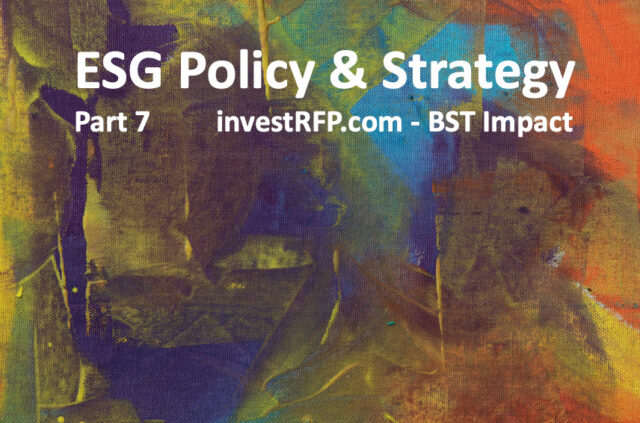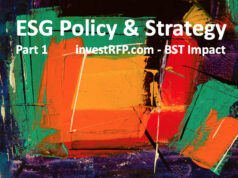By Kristina Touzenis, Managing Partner BST-Impact
| Considering ESG as a real sustainability tool enables investors to identify new sets of financial risks and opportunities. Investors who consider ESG criteria have a more profound insight of an enterprise’s operations, since the due diligence process will take into account a much broader range of information.
This allows investors to better manage the risks linked to human rights violations. Such risks can often result in significant financial impact, including potential impact on the reputation and brand of a company, with repercussions on sales, and legal sanctions on companies and their suppliers.
As well as the broader impact on societies that denial of rights of individuals/groups will have. This effect has become excruciatingly clear with the covid-19 pandemic. The effects of no universal health care, of no living wage, of no social security, of lack of respect for workers’ rights has been clearly exposed. And so has the effects on this inequality on the recovery of societies and economies. Those spiraling quickly into poverty because they already lived in insecurity without effective respect for their rights will not be able to quickly bounce back and take active part in the recovery of the economy.
| Building back better
Many these days talk about building back better after the crisis.
The covid-19 crisis did not create these
inequalities – it merely exposed how bad they
are for everyone in a society, including investors.
Building back better does not mean reinventing the wheel – it means putting the Rights squarely where they belong; underpinning all decisions made at the political, corporate and investor level.
So what to do?
Imagine the following scenario: you have a sustainability initiative in place ensuring that your company does not pollute water, or a programme that is aimed at cleaning up polluted water (or you are an investor in said company). The contribution of such initiatives towards SDG 6 is easily identified, but very often “only” the impact on E in ESG is highlighted. What happens however when people have clean drinking water and access to it too? It is likely to reduce their vulnerability to illness (causing a positive impact on their right to health); healthier children can attend school (fulfilling their right to education), and adults can work (having meaningful access to their right to work).
Furthermore, clean water has a direct impact on the standard of living of the affected communities, by e.g. improving crops quality and livestock health in rural areas, which in turn can influence positively the communities’ economic situation, contributing to the enjoyment of their human rights (e.g. the right to shelter). As this example shows, it is important to consider the spill-over effects of the impact of good (or bad) decisions on water when assessing and reporting on the overall ESG performance of a company.
This article is the Part 7 of a series on “ESG Policy & Strategy”
Part 1: Why asset owners need a good sustainable investment policy and strategy?
Part 2: SFDR aims at preventing greenwashing and ensuring data comparability
Part 3: Working towards the SDGs – at 360 degrees
Part 4: Due Diligence, Supervision and Enforcement Mechanisms
Part 5: Bringing down to “Earth”
Part 7: ESG as a real sustainability tool
Part 8: Awareness and attention towards rights and starndards
Part 10: ESG Policy & Strategy – Key Questions
Expert/Specialist Feedback on investRFP | Kristina Touzenis | BST-Impact
| about
Kristina Touzenis is the Managing Partner of BST Impact. A lawyer and a recognized leader in the effective and concrete operationalization of international human rights standards and principles in complex settings worldwide requiring long-term engagement with a multitude of stakeholders, form both the public and private sectors. She has more than 20 years of experience in advocacy, human rights reporting, monitoring, and evaluating as well as in policy making and negotiating at national, regional, and global level. Kristina founded BST Impact with two other partners in mid 2020, together with a pool of experts to help companies and investors to effectively operationalize ESG criteria, SDGs, international norms and the Business and Human Rights agenda into their respective sustainable business strategies, investment processes and risk assessment management systems. Previously, Kristina created the International Law Unit at the International Organization for Migration – IOM, the UN Agency for Migration and served as Head of the Unit from 2011 to 2020. She engaged with government counterparties on legislation development and review as well as with other Agencies within the UN common system, on advocacy and implementation of programmes worldwide. Prior to her appointment at the IOM HQ, Kristina worked from 2006 to 2011 in the IOM Regional Office for the Mediterranean Region, on translating international norms and standards into practice on the ground and from 2002 to 2006 on implementing children’s rights in the Mediterranean Region for an NGO.
| All opinions expressed are those of the author. investESG.eu is an independent and neutral platform dedicated to generating debate around ESG investing topics.










